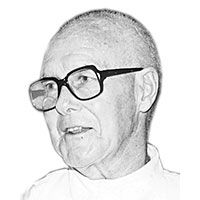The way to peace

February 3, 2007 | 12:00am
 Karen Hughes, the US undersecretary of state for public diplomacy and public affairs, flew to Jolo. When she stepped out of her military helicopter, she was mobbed by hundreds of Muslim school children, waving paper Philippine and US flags.
Karen Hughes, the US undersecretary of state for public diplomacy and public affairs, flew to Jolo. When she stepped out of her military helicopter, she was mobbed by hundreds of Muslim school children, waving paper Philippine and US flags.
When asked how her reception differed from her reception in other Muslim societies, she said: "Well, it’s very heartwarming to see the warm smiles." An American official, deeply involved in this visit, said: "Washington would like to find out what works in Mindanao, and why the US presence is welcomed there and not in other places."
When I read this, my immediate reaction was: "Frank McSorley! If Karen Hughes wants to find out what works in Mindanao, some one should tell her to study the career of a wild, red-headed, Irish-American from Philadelphia, named Frank McSorley!"
Frank came from a family of 15 children – eight boys and seven girls. Five of the boys became priests. Three of the girls became nuns. His mother was "the American mother of the year". One of her sons, Pat, entered the Society of Jesus with me. We were both ordained at Woodstock, Maryland. There, many of the mothers of the boys being ordained asked her: "Didn’t you find it hard, raising 15 children?"
Mrs. McSorley said: "No! Not at all! It was a joy! I loved every one of them!. . . . . .Our only trouble was bringing the old man up!"
In my day, we received sub-deaconate, deaconate and ordination in three successive days. We said our first Mass on the fourth day. So our families stayed at Woodstock for the whole four days. During all that time, you could always tell where the McSorley family was – by the laughter and the noise. They did not need any help to have a party. Wherever they were, it was a party already.
When I came to the Philippines, I met Dick McSorley, the brother of Pat and Frank. He was also a Jesuit, sent to the Philippines as a missionary. Frank had entered the Oblates of Mary Immaculate, and had also been sent to the Philippines, to southern Mindanao as a missionary.
My first meeting with Frank was unusual. During the Japanese Occupation, the American Jesuits were loaded into covered trucks, at four in the morning, at San Agustin Church. We rolled through the dark streets to the auditorium of the University of Santo Tomas. We were kept there for 24 hours, before being taken by railroad to Los Baños.
Frank McSorley was one of the civilian prisoners in the internment camp of UST. He found out that his brother Dick was in the gym. It was forbidden, by the Japanese, for any of the UST prisoners to talk to us. But this was characteristic of Frank. He thought: "At least I’ll try!"
The Japanese guard stopped him, with a rifle, about 20 meters from the side door of the auditorium-gym. But a couple of Jesuits were standing by the door. Frank, seeing us, said to the Japanese guard, but in a voice loud enough for us to hear: "I want to see my brother – Dick McSorley!" Of course the Japanese guard did not care who he wanted to see. He was forbidden to see anybody!
But we ran and told Dick, who came to the door. And that was the visit: Frank talking to the Japanese guard, but looking over the shoulder of the guard, at Dick, who was standing in the door. It was enough for both of them to see that the other one was alive and well.
At that time Frank was dressed in shorts, only. No shirt. His broad chest was covered with crinkly red hair. The red hair on his head had not been cut in some time. No socks or shoes. Chinelas only. He really looked like a wild, red-headed, Irish-American, who loved his brother. Actually Frank risked his life to make that visit over the shoulder of the guard.
Time rolled by. Frank went back to Cotabato with the Oblates of Mary Immaculate, where he was an excellent priest. He was appointed, ordained and installed as the first Bishop of Jolo. The Muslims there were already friendly with the Americans, because of the Oblate Priests and Nuns, who were their friends.
Frank built a school. It was a good Catholic school, taught by Sisters. But 95% of the students were Muslim. Then came the radio station. It was a Catholic radio station, running under the franchise of the Church, but nine of the twelve employees were Muslim. The Imam called his people to prayer over the Catholic radio station. They taught moral values from the Koran. They were deep, human values – Gospel values – but they came from the Koran.
Frank built up the school, visiting the classrooms, helping the families who were in need. One bright Muslim boy wanted to be a doctor. So Frank got him a scholarship at UST, and sent him to Manila to study medicine. He graduated with honors, and passed the Board Exam.
He wrote to Frank: "I have been offered a chance to specialize in the United States. A scholarship. May I take it?" Frank wrote back at once: "By all means! Take the scholarship! Specialize! It will make you more valuable to people, as a doctor." So the Muslim went to the United States to specialize. He needed some support, and Frank gave it, willingly.
He did so well in that specialization that he was offered a position in the United States, as a doctor, working in his specialty. In fear and trembling, he wrote to Frank, afraid that he was betraying his people in Jolo, and betraying Frank himself, his generous benefactor. But Frank replied: "Take it! Stay there! This will make full use of all your talents. And you will represent us among the Americans."
I met this Muslim doctor in upper New York State, when I was bringing the Asian Youth Delegation – a group of Filipino dancers and actors – to the Eucharistic Congress at Lourdes. He found homes, among the families in that area, for every one of my 40 performers. He kept me in his own home.
At night he poured out his story. How grateful he was to Bishop McSorley. He had married, and had seven sons. He named them Francis I, Francis II, Francis III, Francis IV, Francis V, Francis VI, Francis VII. Then he had a girl. So he named her Frances.
Much later, after Frank had gone home to God, a close personal friend of mine, George Dion, became Bishop of Jolo. George was also an Oblate of Mary Immaculate. When he was 75, George wrote his letter of resignation, which all Bishops should do. But Rome did not accept it. The Holy Father thought: "This is a good competent man who loves the Muslims, and they love him. I will leave him there for as long as he can carry on."
I was in Jolo when George had his final heart attack. It was hard for the Muslim bearers to carry him down the stairs on a stretcher, but they did it beautifully, with great care. Afterwards, looking at the steps, I felt that even the stairway was a tribute both to Frank McSorley and to George Dion. Frank built those stairs. Only God knows how many times he and George climbed up them. And when they had Muslim guests, they climbed the stairs with the Muslims. The Muslim guests felt that this was perfectly alright, because in their homes they did not have elevators either.
Frank McSorley never studied foreign affairs. He never earned a doctorate in diplomacy. But he exercised authority with the wisdom of God, crystal clear in the Gospel.
"Put down the sword.
Those who use the sword
Will perish by the sword."
"Little children, love one another,
as I have loved you."
And he lived with his heart, again according to the Gospel:
"Learn of me,
for I am gentle
and humble of heart."
What works in Mindanao? Why is the US presence welcomed there, and not in other places?
Just do it like the wild red-headed Irish-American from Philadelphia, Frank McSorley. Just do it like the driving, energetic, laughing New Englander, George Dion. To foreign service and diplomacy, add just one touch of the Gospel. Do it like Christ Our Lord.
You can reach it on Globe by texting: "Reuter @ 2978"
You can reach it on Smart by texting: "Reuter @ 326"
BrandSpace Articles
<
>
- Latest
- Trending
Trending
Latest
Trending
Latest
Recommended






















